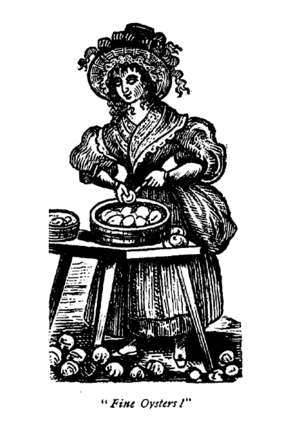Annotation:Oyster Wives Rant (The): Difference between revisions
No edit summary |
No edit summary |
||
| Line 4: | Line 4: | ||
|f_annotation='''OYSTER WIFE'S/WIVES' RANT.''' AKA – "The Oysterwives' Rant." AKA and see "[[Breach of Killiecranky (The)]]," "[[Charles Rant]]," "[[Haughs of Cromdale (The)]]," "[[Haughs of Granbille (The)]]," "[[Muileann Dubh]]." Scottish, English; Reel. England, Northumberland. A Dorian. Standard tuning (fiddle). AABB. Bayard (1981) identifies the melody as belonging to the same tune group as "[[Welcome Home (3)]]," "[[Haughs of Cromdale (The)]]," "(Fare Thee Well) [[Sweet Killaloe]]," "[[Hillside (2) (The)]]," and "[[Wat Ye how the Play Began]]." The members of this very old family, which he calls the "Welcome Home" group, appear in major, modal, duple-time, triple time, vocal and instrumental forms. John Glen ('''Collection of Scottish Dance Music''', 1891) finds the earliest appearance of the tune in print in Robert Bremner's 1757 collection. The title appears in Henry Robson's list of popular Northumbrian song and dance tunes ("The Northern Minstrel's Budget"), which he published c. 1800, and is one of the "missing tunes" from William Vickers' 1770 Northumbrian dance tune manuscript. Some see Irish cognates in the air "[[Óró 'sé do bheatha a bhaile]]/[[Óró Welcome Home]]" and the "[[Ballydesmond Polka (2)]]," but if in fact related, then they are distanced. [[File:oyster.gif|300px|thumb|right|]]<br> | |f_annotation='''OYSTER WIFE'S/WIVES' RANT.''' AKA – "The Oysterwives' Rant." AKA and see "[[Breach of Killiecranky (The)]]," "[[Charles Rant]]," "[[Haughs of Cromdale (The)]]," "[[Haughs of Granbille (The)]]," "[[Muileann Dubh]]." Scottish, English; Reel. England, Northumberland. A Dorian. Standard tuning (fiddle). AABB. Bayard (1981) identifies the melody as belonging to the same tune group as "[[Welcome Home (3)]]," "[[Haughs of Cromdale (The)]]," "(Fare Thee Well) [[Sweet Killaloe]]," "[[Hillside (2) (The)]]," and "[[Wat Ye how the Play Began]]." The members of this very old family, which he calls the "Welcome Home" group, appear in major, modal, duple-time, triple time, vocal and instrumental forms. John Glen ('''Collection of Scottish Dance Music''', 1891) finds the earliest appearance of the tune in print in Robert Bremner's 1757 collection. The title appears in Henry Robson's list of popular Northumbrian song and dance tunes ("The Northern Minstrel's Budget"), which he published c. 1800, and is one of the "missing tunes" from William Vickers' 1770 Northumbrian dance tune manuscript. Some see Irish cognates in the air "[[Óró 'sé do bheatha a bhaile]]/[[Óró Welcome Home]]" and the "[[Ballydesmond Polka (2)]]," but if in fact related, then they are distanced. [[File:oyster.gif|300px|thumb|right|]]<br> | ||
<br> | <br> | ||
"Oyster Wives' Rant" appears in the music manuscript copybooks of Luther Kingsley (1795, Mansfield, Ct.) and Edward Murphey (1790, Newport, R.I.). It also appears in Cumbrian musician John Rook's 1840 music manuscript under the title "[[Charles Rant]]." | "Oyster Wives' Rant" appears in the music manuscript copybooks of Luther Kingsley (1795, Mansfield, Ct.) and Edward Murphey (1790, Newport, R.I.). It also appears in Cumbrian musician John Rook's 1840 music manuscript under the title "[[Charles Rant]]." Later, County Cork uilleann piper and Church of Ireland cleric [[wikipedia:James_Goodman_(musiologist)]] (1828-1896) entered it into Book 2 of his large mid-19th century music manuscript collection, copied from Aird's 1782 volume. An E dorian version of "Oyster Wives Rant" was collected in the early 20th century in Orkney (but described as "a Shetland Air") under the title "Da Scalloway Lasses" | ||
<pre> | <pre> | ||
X:1 | X:1 | ||
Revision as of 02:55, 20 December 2021
X: 1 T: The Oyster Wives Rant R: reel B: Robert Bremner "A Collection of Scots Reels or Country Dances" 1757 p.80 #1 S: http://imslp.org/wiki/A_Collection_of_Scots_Reels_or_Country_Dances_(Bremner,_Robert) Z: 2013 John Chambers <jc:trillian.mit.edu> N: Final bass notes shortened to fix the rhythm. M: C L: 1/8 K: Ador % - - - - - - - - - - - - - - - - - - - - - - - - - V: 1 clef=treble name="1." [V:1] B |\ e2ed eAAB | dedB GABd |e2ed e>fge | dBgB A/A/A A :| |: B |\ edef g2(Tfe) | d>edB d>edB |edef ga(gf) | dBgB A/A/A A :| % - - - - - - - - - - - - - - - - - - - - - - - - - V: 2 clef=bass middle=d z |\ a2a2 a2a2 | g2g2 g2g2 |a2a2 a2a2 | e2e2 A2A :| |: z |a2a2 a2a2 | g2g2 g2g2 |a2a2 a2a2 | e2e2 A2A :| % - - - - - - - - - - - - - - - - - - - - - - - - -

"Oyster Wives' Rant" appears in the music manuscript copybooks of Luther Kingsley (1795, Mansfield, Ct.) and Edward Murphey (1790, Newport, R.I.). It also appears in Cumbrian musician John Rook's 1840 music manuscript under the title "Charles Rant." Later, County Cork uilleann piper and Church of Ireland cleric wikipedia:James_Goodman_(musiologist) (1828-1896) entered it into Book 2 of his large mid-19th century music manuscript collection, copied from Aird's 1782 volume. An E dorian version of "Oyster Wives Rant" was collected in the early 20th century in Orkney (but described as "a Shetland Air") under the title "Da Scalloway Lasses"
X:1 T:Scallowa Lasses, The M:C L:1/16 R:Reel S:"Shetland Air. Played on the fiddle by John Firth, Orkney." N:"Taken down by F.F. McKay, 1912." N:A version of "Oyster Wives Rant." B:"Old-lore Miscellany of Orkney, Shetland, Caithness and Sutherland," Jan, 1913, vol. VI, Part 1, p. 9 Z:AK/Fiddler's Companion K:Edor B4 B3A B3E E3F|A3B A3F D3E F3A|B4 B3A B3E E3F|A3B A3F E4E4:| |:c2|B3A B3c d3e d3B|A3B A3F A3B A3d|B3A B3c d3e d3B|AF3 d3F E4E4:|]
This title, however, usually belongs to another A modal tune (see "Scalloway Lasses (Da)." See also Irish versions as "Breach of Killiecranky (The)."


